#rodrigo duterte
Text
The state of the Philippines after the May 9, 2022 National Elections (Part 2)
continuing from here
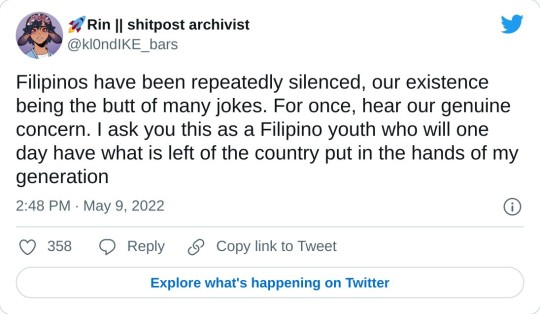
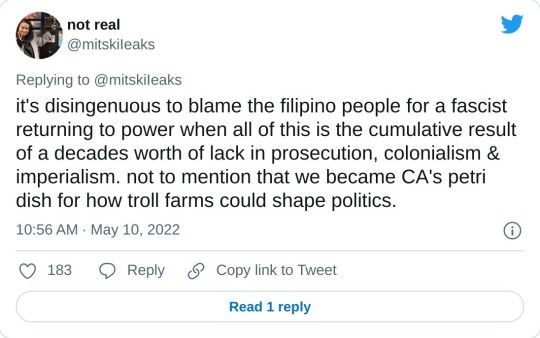
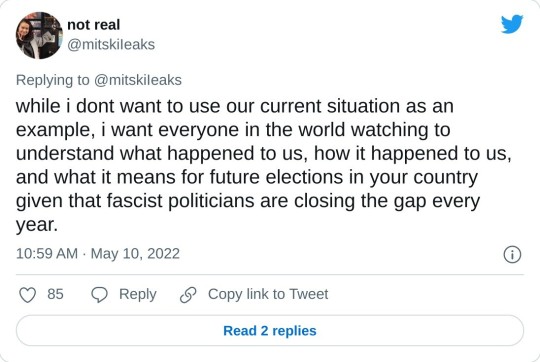
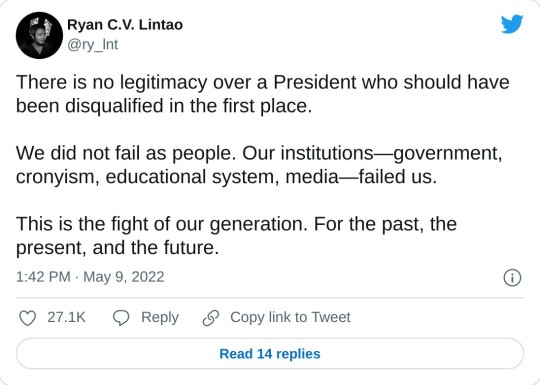
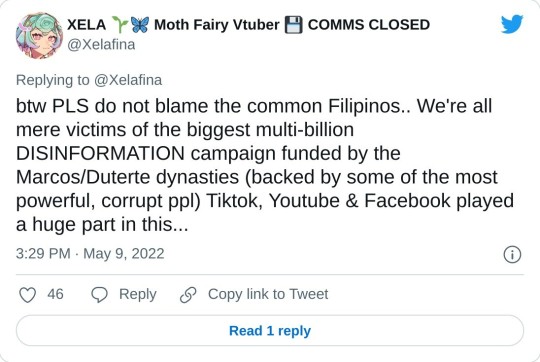

"why are there so many tweets?"
I NEED YOU TO UNDERSTAND THE GRAVITY OF OUR SITUATION, ESPECIALLY FROM THE FILIPINOS' PERSPECTIVE.
this might as well be the only time I get to tell about it too
especially given that we have a history of being silenced and shot down by our political abusers.
read my messages. then try to understand. then read them all again.
I need you to understand and know this well. almost begging, even, because we are in a state of turmoil and we may have to fight for our rights — we might have fight for our lives
and if anyone asks what happened, and if anyone so dares to tell you that we were all fools- i hope by then you will have known the deep struggle we had to go through just to fight for ourselves and the very president we wanted to have
Filipino resilience should not be celebrated.
Accountability must be demanded.

[referring to the Commission on Elections] You are rich in funds. Even if- all we want is ONE reliable VCM (Vote Counting Machine). That's it. That's all we want. Voting should not last beyond 10 minutes, but how many hours have we been in line here?
The resiliency of Filipinos is not an honorary badge.
We should not be used to being sweaty, tired, and hungry.
— from ABS-CBN News Official Twitter
With this in mind, there have been some speculation that PayPal might pull out from the Philippines like they pulled out from Ukraine due to the Ukraine/Russia conflicts.
A freelance illustrator had to personally reach out to PayPal to clarify this.

I would like to end this with an archive of documents, news articles, and resources comprehensively detailing the Marcos era, especially during the Martial Law. He has committed heinous crimes against the Filipino people as well as robbed us of ₱203B which should have long been paid in their estate taxes.
Please help me spread awareness. I cannot trust the international media and news outlets to properly tell our experiences without dubbing us collectively as fools or idiots who let a dictator's son have power. I cannot trust them to tell how we fought so hard and accumulated too many supporters only to be let down by manipulation and exploitation.
That will be all, and thank you for reading.
#[ 🗣️ | the magical girl speaks ]#[ 📢 | the magical girl's signal boost ]#signal boost#boost#philippines#philippine politics#politics#philippine national elections#philippine elections#philippine elections 2022#elections 2022#national elections 2022#halalan 2022#fascism#dictatorship#bongbong marcos#ferdinand marcos#sara duterte#rodrigo duterte#the kingmaker
407 notes
·
View notes
Text
Been seeing a lot of "Kakampinks" (Leni Robredo supporters during the last Philippines election) saying "Tama nga kami" (we were right all along). This is a jab to those who voted for the current President and Vice President of the Philippines, who currently on bad relations with each other, pointing fingers about who is the incompetent one. Spoiler alert: it's both of them.
Anyways, being smug about the election choices that people make does NOT help with the greater cause and what are the real sides of this fight - the ruling class in power and the working class.
Raoul Manuel of the Kabataan Partylist and Member of the Philippine House of Representatives put it so well in the following tweet he posted:
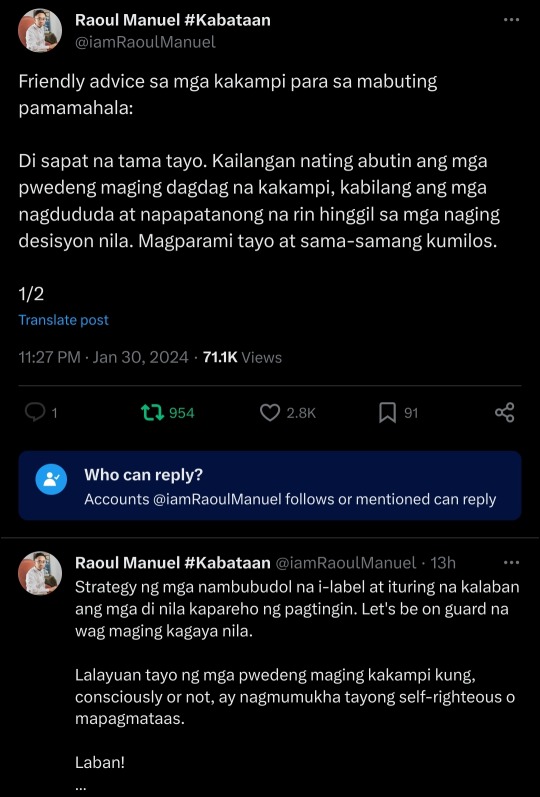
Rough translation:
Friendly advice to allies for good governance:
It is not enough that we are right. We need to reach out to those who can become additional allies, including those who have doubts and are questioned about their decisions. Let's multiply and act together.
It is the strategy of the deceivers to label and consider as enemies those who do not share another's views. Let's be on guard not to be like them.
Potential allies will distance us if, consciously or not, we appear self-righteous or arrogant.
Fight!
#philippines#ph#politics#philippine politics#marcos#duterte#robredo#bongbong marcos#ferdinand marcos#sara duterte#rodrigo duterte#bbm#dds#kakampink#leni robredo
5 notes
·
View notes
Text
⭐️ Friday Vote Battle (Round 58) ⭐️


#fandom#fandom questions#character quiz#quizzes#rounds#politicians#politics#lolitics#world leaders#filipino politics#asian politics#bongbong marcos#rodrigo duterte
3 notes
·
View notes
Text
de lima's gonna sue ex-pres. duterte??? das craaaaaaazy
2 notes
·
View notes
Text
De Lima was arrested in 2017, months after she had launched a senate inquiry into Duterte’s brutal anti-drugs crackdown, which is the subject of an investigation by the international criminal court.
The most prominent critic of the former Philippine president Rodrigo Duterte’s so-called “war on drugs” has been granted bail, after more than six years in jail on what rights groups condemned as trumped-up charges.
Leila de Lima, 64, a former senator and human rights commissioner, emerged from court on Monday to cheers from supporters, who chanted “Justice” and “Leila will soon be free”.
Surrounded by crowds of media and police escorts, she said: “For years, my whole being has been crying out for justice and freedom … For more than six long years I’ve been praying, praying so hard for this day to come.”
De Lima was arrested in 2017, months after she had launched a senate inquiry into Duterte’s brutal anti-drugs crackdown, which is the subject of an investigation by the international criminal court.
Duterte had accused her of receiving payoffs from drugs gangs while she was justice minister, and she faced three drug-related charges, two of which have been dismissed. She has always denied any wrongdoing.
On Monday, she was granted bail in the final pending case, which she had sought on health grounds.
UN human rights experts, as well the European parliament, have long called for her release, and witnesses who testified against her have recanted their statements.
De Lima has said the charges were an act of revenge by Duterte, who she described at the time of her arrest as “a murderer and a sociopathic serial killer”.
She had long criticised his governance. In her former role as chair of the national Commission on Human Rights, De Lima had sought to expose killings by so-called “death squads” in Davao City, where Duterte was mayor for more than two decades.
De Lima was considered the most prominent political prisoner under his administration. In prison she continued her work as a senator, issuing handwritten statements from detention, often condemning Duterte’s governance. She was unable to campaign in the 2022 election, however, and lost an attempt to run again for a senate position.
On Monday, De Lima thanked her legal team, as well as the administration of President Ferdinand Marcos Jr, Duterte’s successor. His administration had, she said, respected “the independence of the judiciary and the rule of law”.
Marcos has previously said he would not cooperate with an ICC investigation into the drugs war killings.
Between 12,000 and 30,000 civilians are estimated to have been killed in connection with anti-drugs operations from July 2016 to March 2019, according to data cited by the ICC.
Government data estimates are lower, and say at least 6,252 people were killed in police operations between July 2016, and May 2022. Police have said any killings were only in self-defence.
#philippines#rodrigo duterte#War on drugs#Leila de Lima#We need more women in politics#Jailed for investigating corruption#davao city#political prisoners#12k to 30k civilians killed between 2016 and 2019
4 notes
·
View notes
Link
On social media, Ferdinand Marcos Jr needed to have all pieces in place to stage a Malacañang comeback: he had a network of propagandist assets, popular myths that justified his family’s obscene wealth, and narratives that distorted the horrors of his father’s rule.
He had even asked Cambridge Analytica to rebrand his family’s image.
The living component among these pieces was Rodrigo Duterte — an ally who, when elected president, normalised Marcos’ machinery, painting over a picture of murders and plunder to show glory and heroism instead.
“I think that really, if we are to make a metaphor [to] describe the role of Duterte to Marcos’ win, it’s really Duterte being the sponsor or a ninong to Marcos Jr…. I think Duterte ultimately is the godfather of this all,” said Fatima Gaw, assistant professor at the University of the Philippines (UP) Diliman.
The alliance
Marcos’ disinformation machinery that was years in the making was complemented by his longtime ties to the Duterte family. Before “Uniteam,” there was “AlDub” or Alyansang Duterte-Bongbong.
Marcos courted Rodrigo Duterte in 2015, but Duterte chose Alan Peter Cayetano to be his running mate. Even then, calls for a Duterte-Marcos tandem persisted.
Gaw said Duterte played a part in driving interest for Marcos-related social media content and making it profitable. The first milestone for this interest, according to Gaw, was when Marcos filed his certificate of candidacy for vice-president in 2015.
They saw an influx of search demand for Marcos history on Google.
“There’s interest already back then but it was amplified and magnified by the alliance with Duterte. So every time there’s a pronouncement from Duterte about, for example, the burial of Marcos Sr. in the Libingan ng mga Bayani, that also spiked interest, and that interest is actually cumulative, it’s not like it’s a one-off thing,” Gaw said in a June interview with Rappler.
Using CrowdTangle, Rappler scanned posts in 2016 with the keyword “Marcos,” yielding over 62,000 results from pages with admins based in the Philippines. Spikes can be seen during key events like the EDSA anniversary, the Pilipinas 2016 debate, election day, and instances after Duterte’s moves to bury the late dictator Ferdinand Marcos at the Libingan ng mga Bayani.
On February 19, 2016, Duterte said that if elected president, he would allow the burial of the late dictator at the Libingan ng mga Bayani. On August 7, 2016, Duterte said that Marcos deserved to be buried at the Libingan ng mga Bayani for being a soldier and a former president.
The burial pushed through on November 18, 2016 and became a major event that allowed the massive whitewashing of the Martial Law period.
Made with flourish
Related content would then gain views, prompting platforms to recommend them and make them more visible, Gaw said. In a research she conducted in 2021 with De La Salle University (DLSU) communication professor Cheryll Soriano, they found that when searching “Marcos history” on YouTube, videos made by amateur content creators or people unaffiliated with professional groups were recommended more than news, institutional, and academic sources.
“A big part of Marcos’ success online and spreading his message and propaganda is because he leveraged both his political alliances with [the] Dutertes, as the front-facing tandem and political partnership. And on the backend, whatever ecosystem that the Duterte administration has established, is something that Marcos already can tap,” Gaw said.
In an upcoming study on social media and disinformation narratives authored by Aries Arugay and Justin Baquisal, they identified four thematic disinformation narratives in the last election campaign — authoritarian nostalgia/fantasy, conspiracy theories (Tallano gold, Yamashita treasure), “strongman”, and democratic disillusionment.
Arugay, a political science professor at UP Diliman, said these four narratives were the “raw materials” for further polarisation in the country.
“Para sa mga kabataan, ’yung mga 18-24, fantasy siya. Kasi naririnig natin ‘yun, ah kaya ko binoto si Bongbong Marcos kasi gusto kong maexperience ‘yung Martial Law,” Arugay said in an interview with Rappler in June.
(For the youth, those aged 18-24, it’s a fantasy. We hear that reasoning, that they voted for Bongbong Marcos because they want to experience Martial Law.)
Arugay described this as “unthinkable,” but pervasive false narratives that the Martial Law era was the golden age of Philippine economy, that no Filipino was poor during that time, that the Philippines was the richest country next to Japan, among many other claims, allowed for such a fantasy to thrive.
Institutionalising disinformation
While traditional propaganda required money and machinery, usually from a top-down system, Gaw said Duterte co-opted and hijacked the existing systems to manipulate the news cycle and online discourse to make a name for himself.
“I think what Duterte has done…is to institutionalise disinformation at the state level,” she said.
This meant that the amplification of Duterte’s messaging became incorporated in activities of the government, perpetuated by the Presidential Communications Operations Office, the Philippine National Police, and the government’s anti-communist task force or the NTF-ELCAC, among others.
Early on, Duterte’s administration legitimized partisan vloggers by hiring some of them in government. Other vloggers served as crisis managers for the PCOO, monitoring social media, alerting the agency about sentiments that were critical of the administration, and spreading positive news about the government.
Bloggers were organized by Pebbles Duque, niece of Health Secretary Francisco Duque III, who himself was criticised over the government’s pandemic response.
Mocha Uson, one of the most infamous pro-Duterte disinformation peddlers, was appointed PCOO assistant secretary earlier in his term. (She ended up campaigning for Isko Moreno in the last election.)
Now, we’re seeing a similar turn of events — Marcos appointed pro-Duterte vlogger Trixie Cruz-Angeles as his press secretary. Under Duterte’s administration, Angeles had been a social media strategist of the PCOO.
Following the Duterte administration’s lead, they are again eyeing the accreditation of vloggers to let them cover Malacañang briefings or press conferences.
“So in the Duterte campaign, of course there were donors, supporters paying for the disinformation actors and workers. Now it’s actually us, the Filipino people, funding disinformation, because it’s now part of the state. So I think that’s the legacy of the Duterte administration and what Marcos has done, is actually to just leverage on that,” Gaw said.
Targeting critics
What pieces of disinformation are Filipinos inadvertently funding? Gaw said that police pages are some of the most popular pages to spread disinformation on Facebook, and that they don’t necessarily talk about police work but instead the various agenda of the state, such as demonising communist groups, activist groups, and other progressive movements.
Emboldened by their chief Duterte, who would launch tirades against his critics during his speeches and insult, curse, and red-tag them, police pages and accounts spread false or misleading content that target activists and critics. They do this by posting them directly or by sharing them from dubious, anonymously-managed pages, a Rappler investigation found.
Facebook later took down a Philippine network that was linked to the military or police, for violating policies on coordinated inauthentic behavior.
The platform has also previously suspended Communications Undersecretary and NTF-ELCAC spokesperson Lorraine Badoy who has long been targeting and brazenly red-tagging individuals and organizations that are critical of the government. She faces several complaints before the Office of the Ombudsman accusing her of violating the Anti-Graft and Corrupt Practices Act and the Code of Conduct for public officials.
“PCOO as an office before wasn’t really a big office, they’re not popular, but all of a sudden they become so salient and so visible in media because they’re able to understand that half of the battle of governance is not just doing the operations of it but also the PR side of it,” Gaw said.
Facebook users recirculated a post Badoy made in January 2016, wherein she talked about the murders of Boyet and Primitivo Mijares under Martial Law. In that post, just six years ago, Badoy called Bongbong an “idiot, talentless son of the dead dickhead dictator.”
Badoy has since disowned such views. In a post on May 2022, Badoy said she only “believed all those lies I was taught in UP” and quoted Joseph Meynard Keynes: “When the facts change, I change my mind.”
Angeles also said the same in June 2022 when netizens surfaced her old tweets criticising the Marcos family. She said, “I changed my mind about it, aren’t we entitled to change our minds?”
But the facts haven’t changed. A 2003 Supreme Court decision declared $658 million worth of Marcos Swiss deposits as ill-gotten. Imelda Marcos’ motion for reconsideration was “denied with finality”.
According to Amnesty International, 70,000 were imprisoned, 34,000 were tortured, and 3,240 were killed under Martial Law.
The rise of alternative news sources
Outside government channels, Badoy co-hosts an SMNI programme named “Laban Kasama ng Bayan” with Jeffrey “Ka Eric” Celiz — who is supposedly a former rebel — where they talk about the communist movement. SMNI is the broadcasting arm of embattled preacher Apollo Quiboloy’s Kingdom of Jesus Christ church.
SMNI has been found to be at the core of the network of online assets who red-tag government critics and attack the media. The content that vloggers and influencers produce to defend Duterte’s administration now bleeds into newscasts by organisations with franchises granted by the government.
The first report of the Digital Public Pulse, a project co-led by Gaw, found that on YouTube, leading politician and government channels, including that of Marcos, directly reach their audiences without the mediation of the media.
“This shift to subscribing to influencers and vloggers as sources of news and information, and now subscribing to nontraditional or non-mainstream sources of information that are [still considered institutional] because they have franchises and they have licences to operate, it’s part of the trend of the growing distrust in mainstream media,” Gaw said.
She said that given the patronage relationship that religious organisations have with politicians, alternative news sources like SMNI and NET25 don’t necessarily practice objective, accountable, or responsible journalism because their interest is different from the usual journalistic organisation.
“I think that in general these two are politically tied and economically incentivised to perform the role that the administration and the incoming presidency of Marcos want them to play, and exactly, serving as an alternative source of information,” she said.
A day after he was proclaimed, Marcos held a press conference with only three reporters, who belonged to SMNI, GMA News, and NET25.
Rappler reviewed NET25’s Facebook posts and found that it has a history of attacking the press, Vice-President Leni Robredo, and her supporters. The network had also released inaccurate reports that put Robredo in a bad light.
Gaw said because these alternative news channels owned by religious institutions have a mutually-benefiting relationship with the government, they are given access to government officials and to stories that other journalists might not have access to. There is thus no incentive for them to report critically and perform the role of providing checks and balances.
“They would essentially be an extension of state propaganda,” Gaw said.
For Arugay, the Marcos campaign was able to take advantage of how the state influenced the standards of journalism.
“Part [of their strategy] is least exposure to unfriendlies, particularly media that’s critical. I think at the end they saw the power of critical media. And once they were able to get an opportunity, they wanted to turn things around. And this is where democracy suffers,” Arugay said.
Under Duterte, journalists and news organisations faced a slew of attacks that threatened their livelihood and freedom. Rappler was banned from covering Malacañang, faced trumped-up charges, then witnessed its CEO Maria Ressa being convicted of cyber libel.
Broadcasting giant ABS-CBN was shut down. Journalist Frenchie Mae Cumpio is in her second year in jail.
While the international community lauds the courageous and critical reporting of Philippine journalists, Filipinos are shutting them out.
All bases covered
While Duterte mostly used a Facebook strategy to win the election, Marcos went all out in 2022 — and it paid off.
“[The] strategy of the Marcos Jr. campaign became very complicated [compared with] the Duterte campaign because back then they were really, they just invested on Facebook. [That’s not the case here]…. No social media tech or platform was disregarded,” Arugay said.
At one point in 2021, YouTube became the most popular social media platform in the Philippines, beating Facebook. Whereas Facebook at least has a third-party fact-checking programme, YouTube barely has any strong policies against disinformation.
“I think with the Marcos campaign, they knew Facebook was a battleground, they deployed all their efforts there as well, but they knew they had to win YouTube. Because that’s where we can build more sophisticated lies and convoluted narratives than on Facebook,” Gaw said.
YouTube’s unclear policies allow lies to thrive
A study by FEU technical consultant Justin Muyot found that Marcos had the highest number of estimated “alternative videos” — those produced by content creators — on YouTube. These videos aimed to shame candidates critical of Marcos and his supporters, endear Marcos to the public, and sow discord between the other presidential candidates.
YouTube is also where hyperpartisan channels thrive by posing as news channels. These were found to be in one major community that includes SMNI and the People’s Television Network.
This legitimises them as a “surrogate to journalistic reporting”.
“That’s why you’re able to sell historical disinformation, you’re able to [have] false narratives about the achievements of the Marcoses, or Bongbong Marcos in particular. You’re able to launch counterattacks to criticisms of Marcos in a very coherent and coordinated way because you’re able to have that space, time, and the immersion required to buy into these narratives,” Gaw said.
Apart from YouTube, Gaw said that Marcos had a “more clear understanding of a cross-platform strategy” across social media.
On Twitter, freshly-made accounts were set up to trend pro-Marcos hashtags. The platform later suspended over 300 accounts from the Marcos supporter base for violating its platform manipulation and spam policy.
Ruining Robredo was a ‘coordinated effort’
Duterte and Marcos had a common target over the years: Robredo. She is another female who was constantly undermined by Duterte, along with Leila de Lima, a victim of character assassination who continues to suffer jail time because of it.
“It has been a coordinated effort of Duterte and Marcos to really undermine her, reap or cultivate hatred against her for whatever reason and to actually attach her to people and parties or groups who have political baggage, for example LP (Liberal Party) even if she’s not running for LP,” Gaw said.
The meta-partisan “news” ecosystem on YouTube, studied by researchers of the Philippine Media Monitoring Laboratory, was found to deliver propaganda using audio-visual and textual cues traditionally associated with broadcast news media.
They revealed patterns of “extreme bias and fabricated information,” repeating falsehoods that, among others, enforce negative views on Robredo’s ties with the Liberal Party and those that make her seem stupid.
Rappler found that the top misogynistic attack words used against Robredo on Facebook posts are “bobo,” “tanga,” “boba,” and “madumb,” all labeling her as stupid.
Fact-checking initiative Tsek.PH also found Robredo to be the top victim of disinformation based on their fact checks done in January 2022.
“By building years and years of lies and basically giving her, manufacturing her political baggage along the way, that made her campaign in [2022] very hard to win, very hard to convert new people because there’s already ambivalence against her,” Gaw said.
Arugay and Gaw both said that the media, academe, and civil society failed to act until it was too late. “The election result and [and where the] political landscape is at now is a product of that neglect,” Gaw said.
There is still a lack of a systemic approach on how to engage with disinformation, said Gaw, since much of it is still untraceable and underground. To add, Arugay said tech companies are to blame for their nature of prioritising profit.
“Just like in 2016, the disinformation network and architecture responsible for the 2022 electoral victory of Marcos Jr. will not die down. They will not fade.
“They will not wither away. They will just transition because the point is no longer to get him elected, the point is for him to govern or make sure that he is protected while in power,” Arugay said.
When the new administration comes in, it will be the public’s responsibility to hold elected officials accountable. But if this strategy — instilled by Duterte’s administration and continued by Marcos — continues, crucifying critics on social media and in real life, blaming past administrations and the opposition for the poor state of the country, and concocting narratives to fool Filipinos, what will reality in the Philippines look like down the line?
Loreben Tuquero is a journalist for Rappler. Republished with permission.
#Southeast Asia#Philippines#Rodrigo Duterte#Bongbong Marcos#Ferdinand Marcos#Disinformation#Journalism#History#Politics
39 notes
·
View notes
Video
youtube
Nobel Peace Prize Winner Maria Ressa on How to Stand Up to a Dictator, December 7, 2022
As Russians are standing strong against Putin's authoritarian rule, our next guest is no stranger to taking on dictators. Journalist and Nobel laureate Maria Ressa is a fearless defender of freedom, exposing corruption and abuse of power in the Philippines. Ressa joins Michel Martin to discuss her new book "How to Stand Up to a Dictator" and to offer tactics for fighting authoritarianism.
Amanpour and Company
#authoritarianism#politics#Maria Ressa#philippines#Rodrigo Duterte#social media#geopolitics#How to Stand Up to a Dictator#propaganda#journalism#Facebook#information#internet#relevant#PBS#media#identity#technology#Amanpour and Company#Michel Martin#narrative#freedom of the press#ethics
7 notes
·
View notes
Link
Since 2016, the Philippines has suffered neo-fascist rule. First at the hands of U.S.-backed dictator Rodrigo Duterte and now by his successor, Bongbong Marcos, who took office in June. The individual office holder has changed, but the political reality remains the same.
The political prisoner crisis in the Philippines has exploded in the past six years. There is a severe and disturbing irony in BongBong Marcos lecturing any country about their treatment of political prisoners when his fascist government is one of the most notorious for using prison and torture to subdue progressive and revolutionary political forces.
#political prisoners#Philippines#Myanmar#imperialism#bongbong marcos#Rodrigo Duterte#torture#Singapore#protest#Struggle La Lucha
8 notes
·
View notes
Text
On How the Moonies Take Advantage of Imperialist Crises in Today’s Philippines

▲ Pictured: A class at the International Peace Leadership College prior to the rehabilitation program
The Philippines has a long history of facing violence and exploitation, as well as violent repression. The brutal crackdown on alleged drug users and dealers by President Rodrigo Duterte’s “War on Drugs” is one example that has has left over 27,000, mostly from poor and working-class backgrounds, murdered. Thousands of others have been subjected to extrajudicial killings, indiscriminate bombing, and widespread human rights abuses at the hands of the government and its security forces, under both Duterte and Marcos Jr., often for alleged "terrorist activity".
This violence is directly linked to the country's history of imperialism and feudalism, which continue to shape Philippine society today.
The Unification Church, also known as the Moonies, has taken advantage of this exploitative system in a number of ways.
One way, since at least the early 90s, has been to deceive women in the Philippines into marrying men in South Korea. Many of these women joined the Unification Church out of sincere faith in Moon, believing that they had found a God-centered “solution” to the problems of society, and were receiving their “matching” out of religious duty. Many were also tricked into joining the Unification Church, having the matching and blessing framed as a career opportunity abroad, with some of their families pushing them to go through with the matching so they could send financial support back from abroad. Many of these women were of course sent to church-owned factories or to become “help” for church leaders, some were even directly brought into the sex trade, but thousands are known to have been matched to farmers in rural Korea who were not church members but had saw an ad in the newspaper put out by the UC, framing the blessing as a marriage service.
According to Toshiko Tsujimoto in "Church Organization and Its Networks for the Filipino Migrants: Surviving and Empowering in Korea," the Filipino Catholic Center in Seoul had women escaping these marriages come to their doors almost every day in the 2000s, speaking up about the abuse and violence they were enduring.
The UC, in cooperation with their front organization and “Abel UN” Universal Peace Federation, have also taken advantage of Duterte’s War on Drugs.
The church operates the International Peace Leadership College (ILPC), which was originally a seminary for Philippine Moonies but now it trains arrested drug users in Unification theology and martial arts and "character education,” as well as having these “students” (inmates) do community service.
Many of the participants in this program eventually join the church and become members of its student group, CARP. The program has been used as a recruitment tool for the Unification Church, and its ultimate goal is to prepare a thousand missionaries to go out into the world every year.
The UC has poured millions of dollars into courting many of the Philippines’ top families belonging to this bureaucrat capitalist class that controls the government, military, and economy. The UC in the Philippines is known for their “VIP Providence,” which had members faithfully tend to the country’s top government, military, and cultural leaders. The UC has also paid many of these leaders to attend their conferences, speak at events, and become members of their various organizations and boards.
The violences of the Unification Church go back beyond the 90s, as UC members were known to have organized in the Philippines on behalf of the WACL in the 70s, and later on CAUSA and other related organizations. These organizations were also said to have funded and organized vigilante violence against communists, even supporting paramilitary “death squad” groups that are responsible for the deaths of thousands who were rumored to be connected or sympathetic to communism. This includes thousands of social workers, teachers, nuns, priests, activists, etc., since the ousting of Marcos.
These groups often coordinate with the Armed Forces of the Philippines and the Philippine National Police, and can effectively act as a cover for the Philippine government to avoid accountability. These groups have been identified countless times posing as “New Peoples Army,” committing heinous terrorist attacks as a form of “black propaganda” against the communists.
The legacy of the violent drug policies and the historic “labor export” policies are already continuing under the new president, Bongbong Marcos, and his vice-president, Duterte's daughter, as countless Filipinos continue to be red-tagged, imprisoned, tortured, and murdered. The Philippines remains a country deeply affected by the legacy of imperialism, feudalism, and bureaucrat capitalism, and its citizens continue to be vulnerable to exploitation and violence from both local and international actors, including from the Korea-based Unification Church and its related organizations. Even with the abhorrent repression, the Filipino people continue to organize and struggle to overthrow feudalism, bureaucrat captailism, and imperialism. It is worth learning from their work and struggle, which has fueled a 50-year war for social and national liberation, and doing what we can to support them!
Related articles
One Account of Being Trafficked into Prostitution Through UC “Blessing”
Human trafficking is despicable. Here is one Filipina’s story of slavery in the Unification Church
The UC should be held responsible for supplying weapons that killed young Filipino activists
The Broad Counterinsurgency Strategies of the US in the 80s, and a Glimpse into the UC’s Role
In 1985 the Washington Times sponsored a fund for the Contras who committed atrocities, and trafficked drugs to the US
Moonies demanded $2,000 from Koreans who wanted to have Filipinas as “housemaids and sex partners.”
UNESCO Report: Korean-Filipino marriages under the UC sparked controversy and animosity
#CARP#feudalism#bureaucrat capitalism#imperialism#neo-colonialism#marriage trafficking#marriage#martial arts#character education#war on drugs#bongbong marcos#marcos#rodrigo duterte#duterte#moonies#ffwpu#upf#universal peace federation#family federation for world peace and unification#unification church in the philippines#Unification Church
2 notes
·
View notes
Video
youtube
Filipino journalist Maria Ressa won the 2021 Nobel Peace Prize with co-recipient Dmitry Muratov.
Ms. Ressa has stood up to autocrats in the Philippines and is founder of the respected news site Rappler.
In her new book How to Stand Up to a Dictator: The Fight for Our Future she devotes four chapters to the toxic effects of social media on democracy.
She makes the point that social media platforms are not being held responsible for content and therefore get away with misinformation, libel, and incitement.
I would add that by continuing to use problematic platforms, we empower them to continue policies which degrade democracy while growing the wealth of the owners and shareholders of such companies.
It’s necessary to be more discriminating in our choice of platforms. We should not empower malevolent billionaires with anti-democratic agendas.
If you liked Maria Ressa’s conversation with Velshi, you might also find interesting her recent appearance on NPR.
Journalist Maria Ressa explains 'How to Stand Up to a Dictator'
In general, Americans need to take more interest in the Philippines. The country still suffers from some of the lingering aftereffects of President William McKinley’s attempt to turn it into a US colony after the Spanish-American War.
@npr @dnlfelix
#maria ressa#philippines#rappler#press freedom#ali velshi#memoir#book#how to stand up to a dictator: the fight for our future#democracy#social media#rodrigo duterte#authoritarianism#pilipinas#pinoy
2 notes
·
View notes
Text
The state of the Philippines after the May 9, 2022 National Elections (Part 1)
as of May 11, 2022, 8:57 PM
The following post was initially written in Discord as a long string of messages for my overseas/international/foreign internet friends.
The original messages have been kept intact with some grammatical corrections as well as formatting modifications and minor additions for better emphasis.
Indented texts are the ones which were originally Discord messages while non-indented texts are new additions.
With that aside, the content remains the same as it was initially sent to my friends.
Now, without further ado, let me begin.
hi
it has been two days since May 9
it has been two days since my country's national elections
right now we're in massive chaos because the son (Bongbong Marcos) of a past dictator (Ferdinand E. Marcos) is threatening to become our next president // as well as the daughter (Sara Duterte) of our last president (Rodrigo Duterte) becoming vice president
policital dynasties, yall. fucking hell
anyway
you might be wondering, "is Isa ok? how is she faring?"
I'm still fairly okay, but with the way I've been vocal about the bullshit going on I might not be able to be online any longer
this country has a history of its own people being silenced by those in power
international media will tell you that we voted the dictator's son into presidency and that we are fools.
do not let them convince you.
we fought so hard. we fought so hard for the only woman running for presidency and we accumulated so many supporters and yet we failed.
wait, no. we were cheated.
how?
because of the shit we call corruption and greed
corruption and greed and power and MANIPULATION
OUR MASSES WERE MANIPULATED INTO VOTING THE DICTATOR'S SON.
lucky are the ones who are born in the middle class, and yet luckier are those who were born rich.
unfortunate are those who were born so poor that their main priority is living day by day.
votes were bought.
machines were rigged.
servers were hacked.
just for the dictator's son to be called president.
just to enable a new abuser and give him power.
please do not let the media convince you that we were fools.
we fought so hard for the right presidential candidate not to be thought like this.
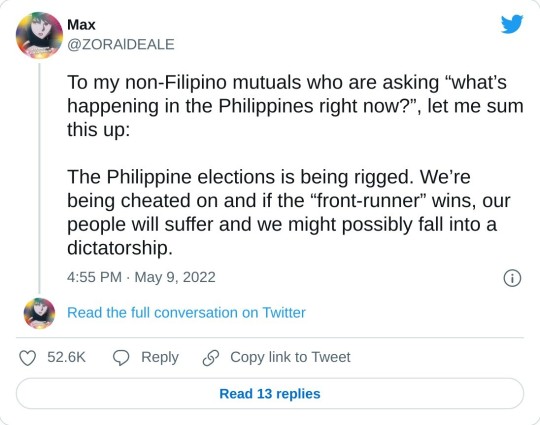

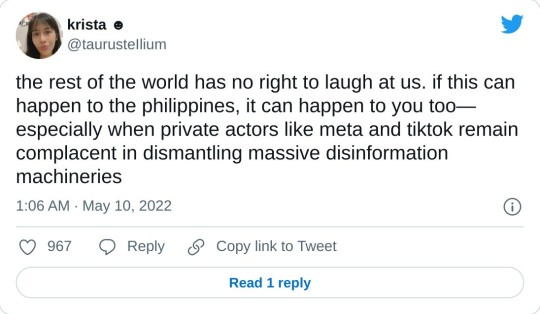

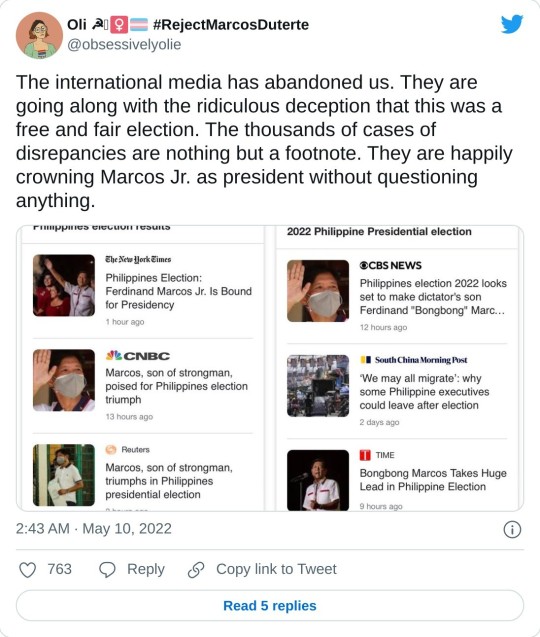

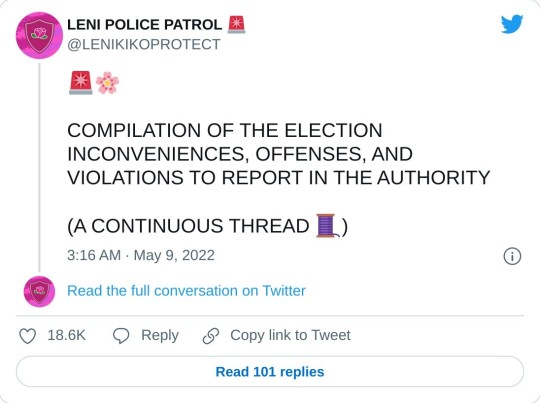
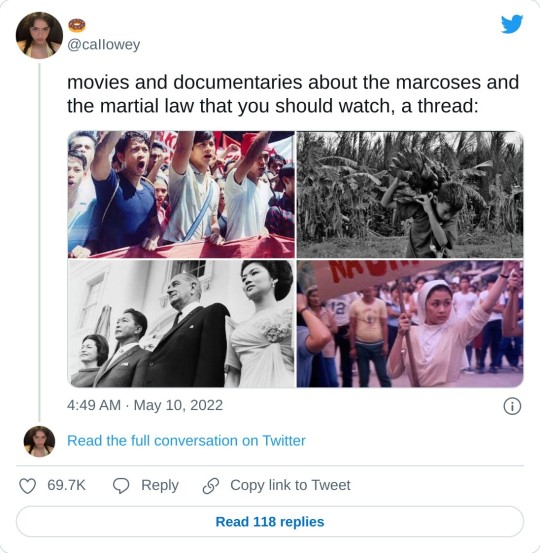
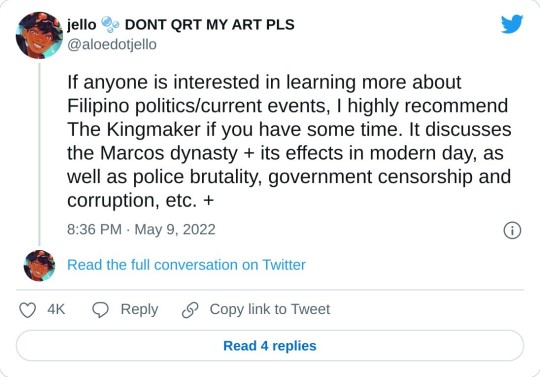

compilation thread of election inconveniences, offenses, and violations
thread of movies and documentaries about the Marcoses and the era of Martial Law under Ferdinand E. Marcos
watch The Kingmaker for free [available Philippines only as per Lauren Greenfield's intentions]
The post continues here due to Tumblr's 10-photo limit.
#[ 🗣️ | the magical girl speaks ]#[ 📢 | the magical girl's signal boost ]#signal boost#boost#philippines#philippine politics#politics#philippine national elections#philippine elections#philippine elections 2022#elections 2022#national elections 2022#halalan 2022#fascism#dictatorship#bongbong marcos#ferdinand marcos#sara duterte#rodrigo duterte#the kingmaker
193 notes
·
View notes
Text
Guys my friend sent me this bongbong x duterte fanfiction..first i was like laughing so hard..then i started liking it..😭
#shitpost#you know who you are#sometimes sharing isnt caring#bad thing is i liked the fic#WHY#bong bong marcos#bongbong x duterte#rodrigo duterte#i have to tag it..#THE URGE TO REREAD ISKO X READER AGAIN.#ph stuff
4 notes
·
View notes
Quote
Voters in the Philippines have long shown a partiality to strongman rule, to roguish characters who promise to dispense with the messy compromises of democracy and get things done. That explains the election of Joseph Estrada in 1998, and more recently in the 2016 of Mr Duterte, who made no secret of his impatience with democratic norms. Bongbong Marcos does not have that kind of charisma, but he has run largely on refashioned memories of the strongman rule of his father.
Jonathan Head, ‘What the Marcos' return to power means for the Philippines’, BBC
#BBC#Jonathan Head#Philippines#democracy#Joseph Estrada#Rodrigo Duterte#charisma#strongman rule#bongbong marcos
2 notes
·
View notes
Text
SALAMAT, PRRD
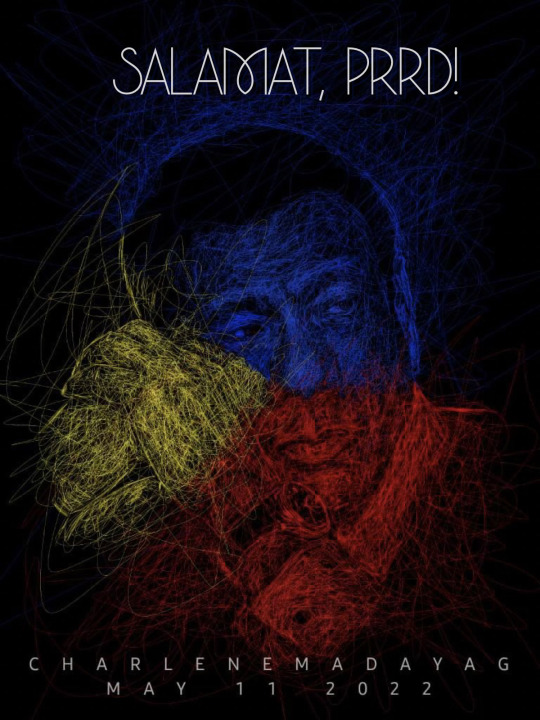
2 notes
·
View notes
Photo
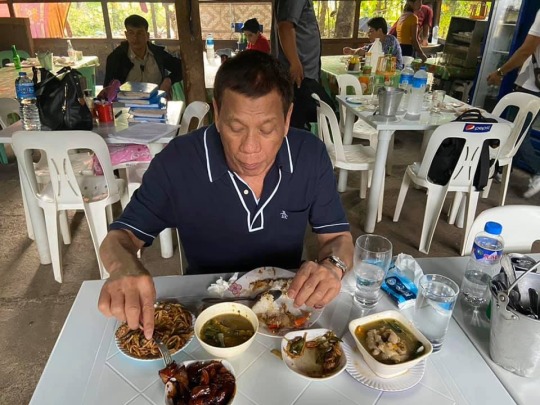
Philippines outgoing President Rodrigo Duterte, in an old pic of him eating at his old favorite food stall in Davao City. Once he steps down from his presidency I’m sure he’ll frequent there again.
Simple man with simple tastes. I like that!
#philippines#rodrigo duterte#rodrigo roa duterte#food#politicians#food vs politicans#politicians vs food#eating#politics
2 notes
·
View notes
Text
Panelo Denies "Gentleman's Agreement" with China on West Philippine Sea
Manila, Philippines – Tensions simmer between the Philippines and China over the disputed West Philippine Sea, with newly-elected President Ferdinand Marcos Jr. expressing anxieties about a potential “gentleman’s agreement” with China that may have undermined the Philippines’ claims. However, former President Rodrigo Duterte’s spokesperson, Salvador Panelo, vehemently denied the existence of such…
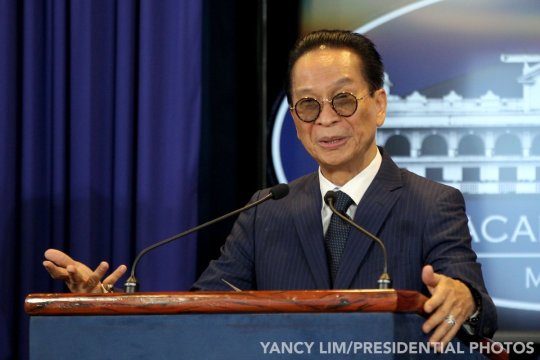
View On WordPress
#china#news#philippines#politics#Pres. Bongbong Marcos Jr#PRESS PLUSS DAILY#Rodrigo Duterte#SALVADOR PANELO#South China Sea#West Philippine Sea#XI JIN PING
0 notes